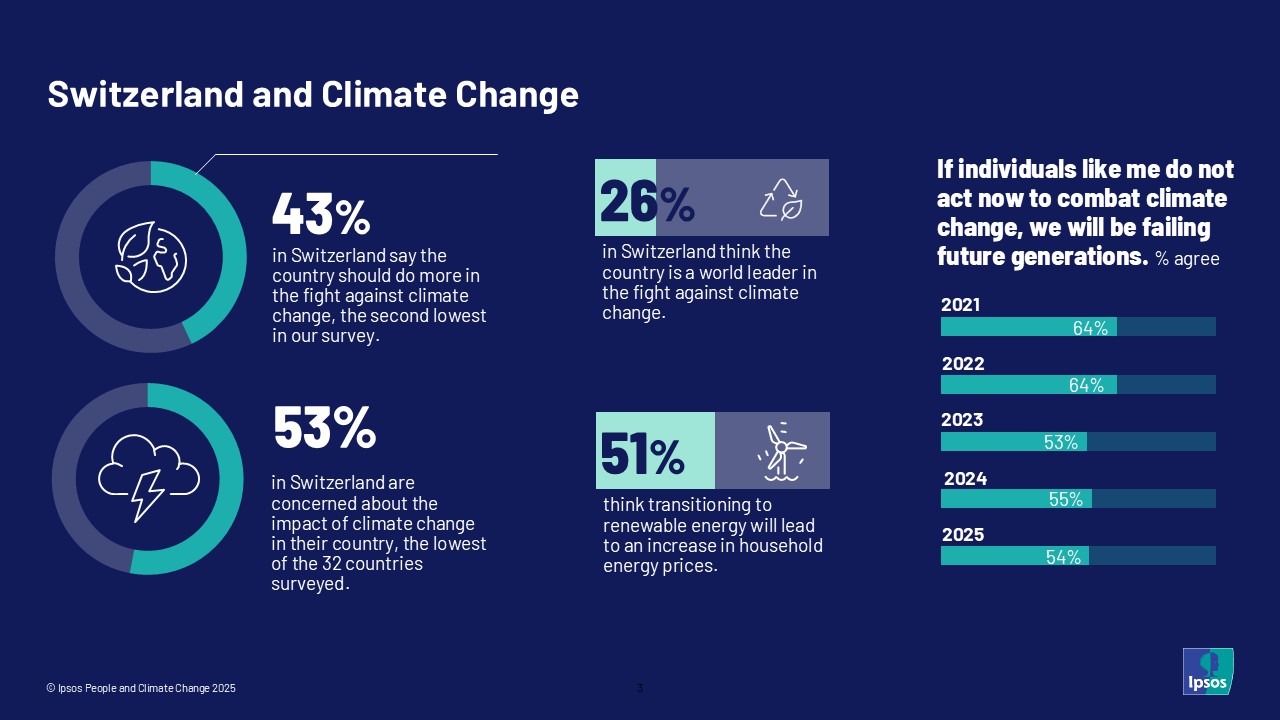Swiss signal less urgency in climate change mitigation than global and European peers
The study explores perceptions of the risks posed from the climate crisis and identifies where responsibility for greater action lies. Over 23,000 people across 32 countries, including 500 participants from Switzerland, were surveyed.
Ipsos, one of the world's leading global market research companies, announces the findings of a new 32-country study for Earth Day. Key findings of the Ipsos People and Climate Change Report include:

Key Findings:
- Long-term trends indicate fewer people feel individual action is needed
- Half of Swiss (54%) say that if individuals don’t act now, they will be failing future generations. Germans have same level of concern (53%), whereas France (63%) and Italy (64%) feel more concerned. From a long-term perspective, all countries surveyed have experienced a decline in the proportion of people who agree with this statement since 2021, with Switzerland seeing a 10-percentage point decrease.
- While concern about the impact of climate change is rising in most parts of the world, the trend in Switzerland differs. In 2022, 58% of Swiss felt concerned about the impacts of climate change; today, this figure is down 5 percentage points representing the lowest figure of all countries surveyed. (Germany 62 %, France 75 % and Italy 76 % and global average 74%.)
- People divided on whether their country should take more action
- 43% of Swiss citizens believe Switzerland should do more in the fight against climate change, a view shared by Germans (41%) but significantly lower than global average (62%) and neighbouring countries like France (53%) and Italy (64%).
- Conversely, one third of Swiss (33%) believe they are sacrificing too much in the fight against climate change; similar levels as Germany (29%), Italy (32%), lower than France (38%).
- Across the globe, very few citizens believe their country is “a world leader in the fight against climate change”. This is reflected in Switzerland, where only 26% of people agree with that sentiment (36% disagree and 38% do not know).
- Financial concerns hinder transition from fossil fuels.
- Nearly half of Swiss surveyed (51%) believe transitioning to renewables will lead to an increase in energy prices, a sentiment echoed by a majority in Germany, the Netherlands and France.
- Half of Swiss respondents (50%) think ‘`Electric cars are as bad for the planet as petrol/gas-powered cars’, a view shared more widely among their European neighbours (France 58%, Germany 50%, Italy 44%) than the rest of the world (global average: 34%).
Register Now to Download the Complete Report
Switzerland is at a crossroads in the fight against climate change, needing to intensify its national focus to match global peers. The country's resources and innovation enable it to lead effectively in the quest for net zero by 2050 and reduce reliance on fossil fuels. By promoting sustainability and supporting strong policies, Switzerland can navigate challenges and move towards a greener future" shares Marcus Burke, ESG Lead at Ipsos in Switzerland.
Technical note:
- The “32-country average” reflects the average result for all the countries and markets where the survey was conducted. It has not been adjusted to the population size of each country or market and is not intended to suggest a total result.
- Ipsos interviewed 23,745 people online between January 24, 2025, and February 7, 2025, in 32 countries. Quotas were set to ensure representativeness and data have been weighted to the known population profile of each country. The sample consists of approximately 1,000 individuals each in Australia, Brazil, Canada, France, Germany, Great Britain, Italy, Japan, New Zealand, the Philippines, Spain, and the U.S., and 500 individuals each in Argentina, Belgium, Chile, Colombia, Hungary, Indonesia, Ireland, Malaysia, Mexico, the Netherlands, Peru, Poland, Singapore, South Africa, South Korea, Sweden, Switzerland, Thailand, and Türkiye. The sample in India consists of approximately 2,200 individuals, of whom approximately 1,800 were interviewed face-to-face and 400 were interviewed online.





